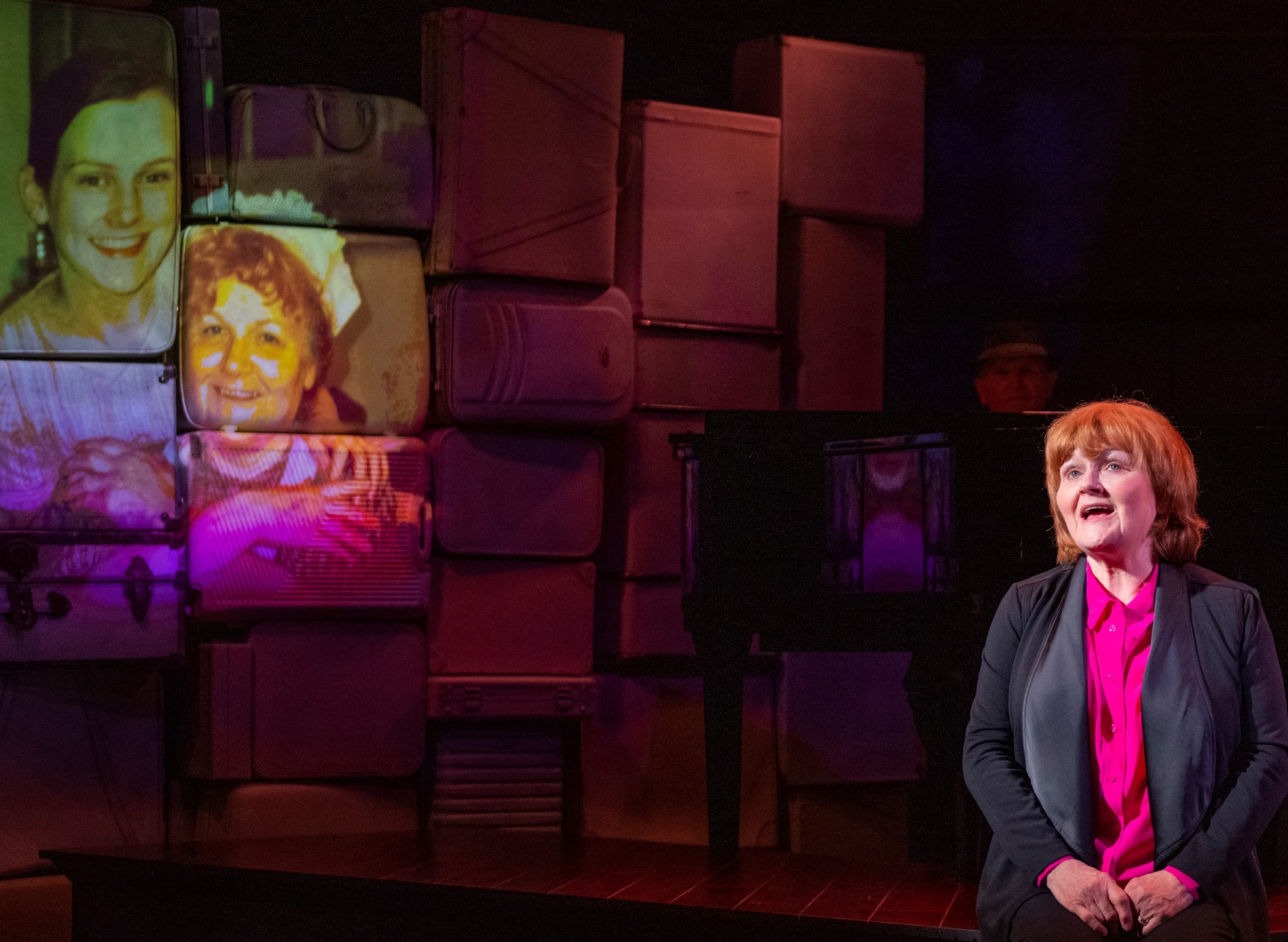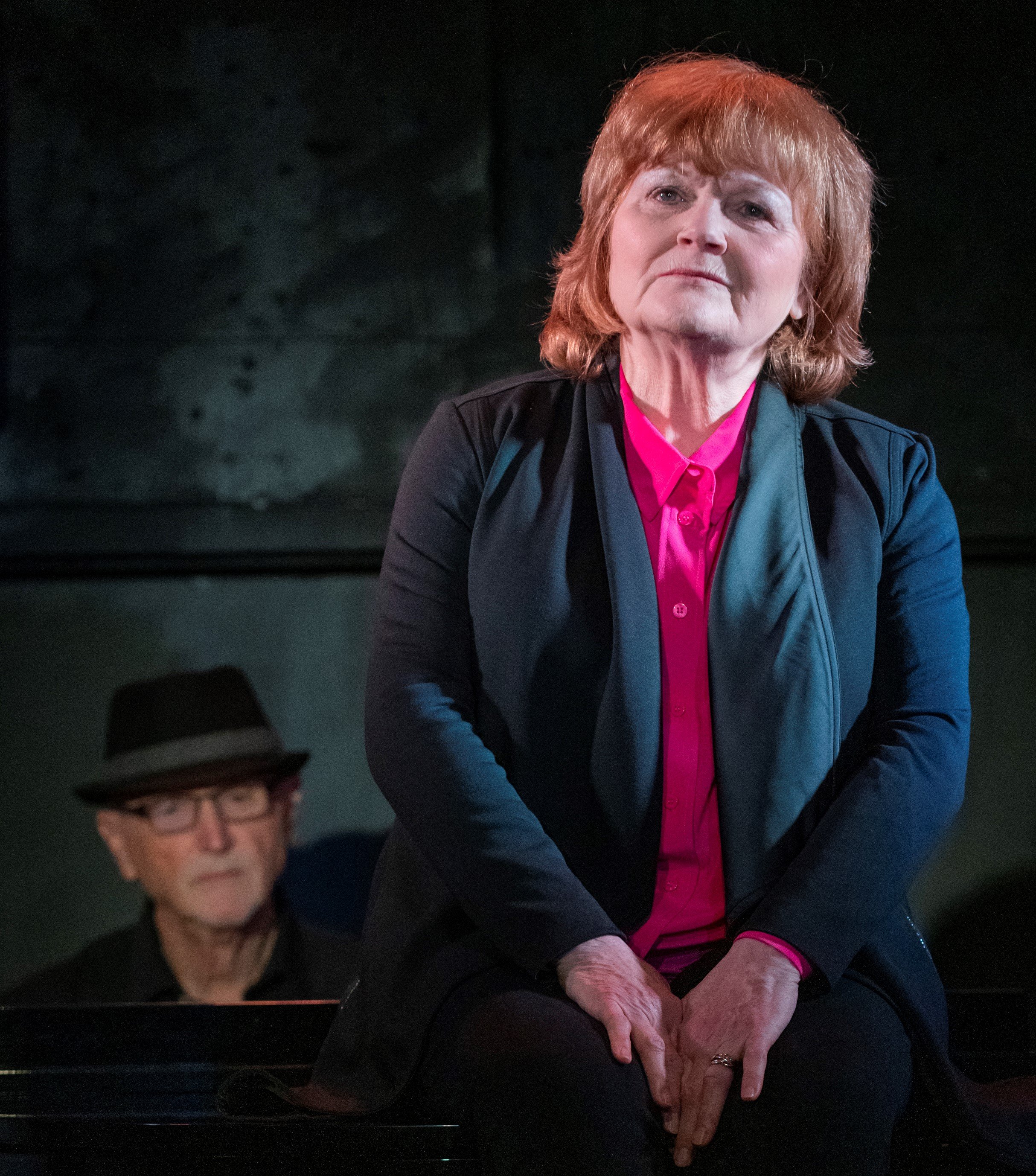Lesley Nicol reminisces about her friendship with Sophie McShera (in projection at left), her fellow Downton Abbey cast member.
For Downtown Abbey aficionados, it is an unlikely stretch to imagine Lesley Nicol as anyone other than the series’ jovial, wise cook, Mrs. Patmore. The leap of imagination that transforms Patmore into a painfully shy, insecure, aspiring and often overlooked actress is a dilemma with which the audience for How the Hell Did I Get Here? must grapple. Ironically, Mrs. Patmore and Ms. Nicol may share a Northern British accent, but that’s where any comparison ends. The former’s “extreme makeover” as fashionable Lesley Nicol is not a makeover at all, but an internal and external transformation from her early childhood. Isn’t that what good acting is all about?
But wait—this is a musical, and it also relies on Nicol’s collaboration with acclaimed veteran pop composer Mark Mueller. Mueller churns out tunes that emanate as much from a pure place in Nicol’s heart as they do from the ink and paper that notate their joint score. Those tunes propel the show as it encompasses Nicol’s childhood near Manchester, a near-disastrous boarding-school experience, a post–drama school saga of theatrical disappointments, and the eventual vindication of her talent through offers of substantive, long-term roles.
Nicol’s life evolves slowly in a cabaret environment—that is, cabaret style, in terms of range, delivery, and the intimacy of the venue. There are no tables in the tiny theater space, only lightweight black lacquered chairs, side by side in neat rows that align with each other and upon which a mostly young crowd sips drinks.
Nicol with co-composer/lyricist Mark Mueller (left). Photographs by Michael Brosilow.
Scenic designer Anshuman Bhatia’s ingenious multipurpose set, adorned with suitcases piled ceiling high, serves as the backdrop against which the enlarged photos of Nicol, her family, and companions at various stages of her life are projected and loom large. The cases also provide storage for her cooking props, bits of costume, and other objects to accompany Nicol on her journey through life.
Despite the relatively young audience, Luke Kernaghan’s savvy direction helps Nicol’s humor hit a palpable chord, and those present explode with laughter at Nicol’s cooking class fiasco and her nostalgic reminiscences of her “bonnie” (read chubby) awkward preteen self. There is a universality to vulnerability and the projections of her with her best friend, the father she adored, and the mother whom she admired but with whom she had a conflicted relationship make Nicol’s vulnerability tangible.
Nicol’s father, a family doctor in a small Lancashire town, she describes as “a quiet, gentle, modest man…My mother Sue…was not quiet, not always gentle, and definitely not modest…larger than life... glamorous, hugely confident and the life and soul of the party. A very hard act to follow.”
And so, in “Why?” specs on eyes, Nicol, as the 6-year-old she once was, belts:
I-N-V-I-S-I-B-L-E
Is all I want to be
Won’t somebody set me free
I really wish I wasn’t me
In Nicol’s journey, her parents, particularly her mother, figure heavily in her shaping her childhood and subsequent self-image. While Nicol doesn’t quite emerge from her awkward duckling stage as a swan, being onstage cures her shyness, and her London voice and theater training as a twentysomething yield evidence of talent.
“Slowly and tentatively the short, bonnie, and insecure child morphs into a confident actress.”
She doesn’t skyrocket to stardom, and while some of her mentors are kind, others, like one in Manchester, suggest that she’ll do better in her forties. Some of her roles, such as the Beaver in The Lion, the Witch and the Wardrobe, may have been more memorable to children than adults, but slowly and tentatively the short, bonnie, and insecure child morphs into a confident actress with steady work who can succeed as a broad range of characters. On Nicol’s career path, she experiences love, at first, a time-limited one, and then a life-partner relationship. The audience may not fully grasp Nicol’s cultural references or the vicissitudes of a profession where rejection is the norm, but it’s possible to relish her personal and professional successes. Between Mueller’s crisp musical confections and her witty rejoinders (she quips in her cooking class scene that who knows, maybe someday she will get a role as a cook), she has an audience in the palm of her hand.
For all the legitimate histrionics and vocal versatility that trace Nicol’s upbringing and somewhat haphazard leap, or rather, creep into stardom, she is her most compelling when she is least theatrical, when the cabaret music, as excellent as it is, subsides, and when, toward the end of the show, she sits downstage, gazing earnestly at the faces in the audience, and just shares.
How the Hell Did I Get Here runs at the McKittrick Hotel through May 8. Evening performances are at 8 p.m. Monday and Wednesday and at 7 p.m. Thursday through Saturday; matinees are at 3 p.m. Saturday and 2 p.m. Sunday. For more information, call (212) 904-1880 or visit mckittrickhotel.com/the-club-car/.




